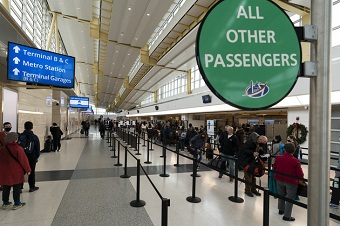The TSA has contended that people with disabilities who can’t comply with security screening protocols due to their disability essentially won’t be able to fly, in a case heard before the D.C. Circuit Court of Appeals.
The court was hearing arguments related to the case of Rohan Ramsingh v. TSA, where the agency fined Ramsingh for interfering with the security screening process during a 2019 incident at the Tampa International Airport.
TSA argues that Ramsingh had refused to comply with requests from baggage screeners and so was denied boarding. Ramsingh’s attorney argues that he didn’t refuse their directives, but rather couldn’t comply due to a disability.
Arguing for TSA, Kyle Edwards, an attorney for the DOJ’s civil division, made a case that TSA’s security obligations — mandated by law — take precedence over granting allowances for passengers, even those with disabilities.
“It’s the case here that if certain passengers cannot go through the process due to their disabilities, or due to other reasons, they simply won’t be able to fly,” Edwards said before Judges Judith Rogers, Patricia Millett and Gregory Katsas. “And it is the case that Congress has required the screening of all passengers and property to ensure that there’s no prohibited items that may get on board.”
Ramsingh previously appealed to the TSA directly to throw out the interference charge and associated $2,050 civil penalty fee, which was reduced to $680. TSA denied the request.
According to the petition filed in August, Ramsingh was moving through the security checkpoint process when he set off the explosive trace detection device and needed further screening. Screeners moved him to an imaging machine, but Ramsingh informed the agents that he was physically unable to raise his arms as directed. A screener then informed him that TSA procedures “dictated that a pat down search was necessary to resolve the positive” test, according to the filing. Ramsingh declined the pat down.
The hearing revealed Ramsingh did not want the pat down because of post traumatic stress stemming from past sexual trauma. TSA offered a pat-down search in a more private area of the checkpoint, but Ramsingh again declined, stating he would just leave the checkpoint area.
TSA then called the Tampa Airport Police to remove Ramsingh from the area for non-compliance, though Ramsingh’s attorney contends he wasn’t disruptive or combative during the incident. TSA meanwhile argued Ramsingh’s refusal to complete the screening process “interfered with TSA screening personnel in the performance of their duties.”








